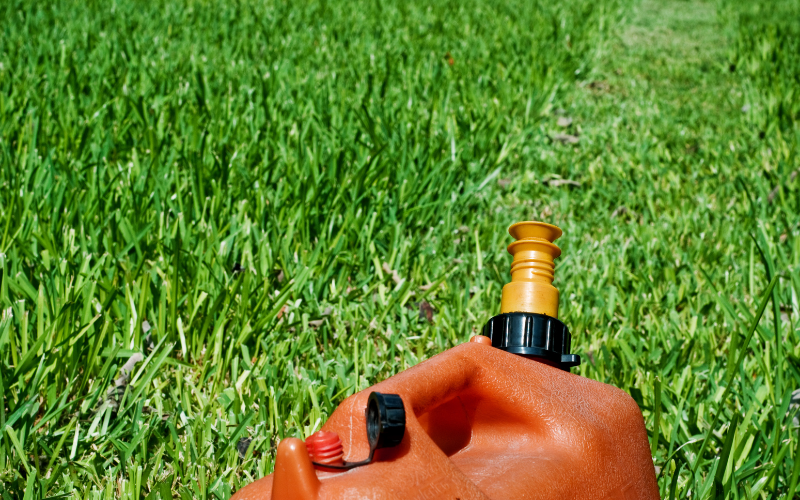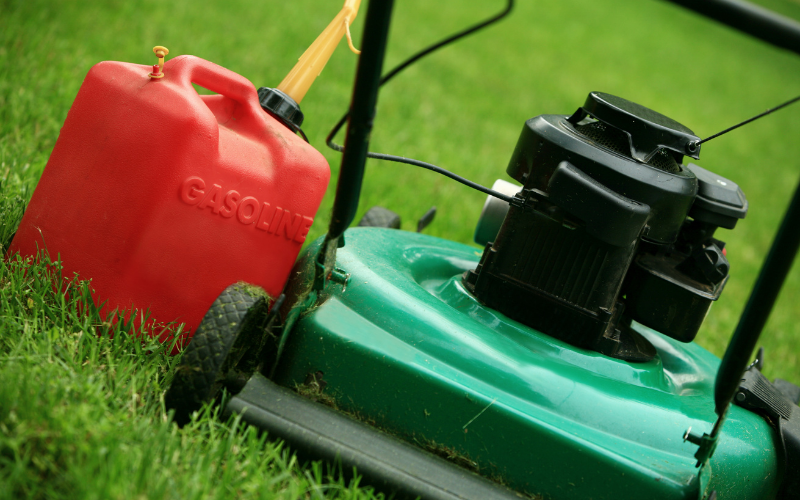Almost everyone has spilled gasoline on the grass while topping off the fuel tank on the mower. The usual next thought is “Will gasoline kill grass?” Here are the facts on gasoline spills on grass.

Will Gasoline Kill Grass?
Yes, gasoline kills grass. Dr. Beard and Dr. John from the Department of Soil and Crop Sciences at Texas A&M University did a study looking at the effects of gasoline spills on grass. According to them, leaf burn begins within the first 20 minutes after the spill. Grass dies rapidly with no hope of saving it, even if you drench it immediately with water.
What Is Gasoline?
Gasoline is 85-88% carbon, 12-15% hydrogen and no oxygen. It often contains over 500 individual compounds and is very flammable. It is insoluble in water so floats on the surface. A gasoline fire will only spread if water is poured on it. Firefighting foam is required to put it out. In addition, gasoline sinks into the soil, where it can cause the contamination of groundwater.
What Does Gasoline Do To Grass?
Gasoline kills Bermuda grass and other turfgrasses by rapidly dehydrating the leaves. In the study I just mentioned, within 30 minutes of application, the leaf blades were rapidly drying. The leaves were rolling, and they were darker than the untreated control grass. Within one hour, leaf roll was severe. The grass was completely brown within 16 hours.
What to Use Instead Of Gasoline to Kill Your Grass
In the event that you are actually trying to kill a patch of grass, you should use a herbicide. It is dangerous and illegal to use gasoline to kill grass or weeds. For broadleaf weeds and St. Augustine and other broadleaf grasses, use 2,4,D. This will not harm Bermuda grass and narrow leaf grasses if you follow the directions on the herbicide. If you want to kill narrow-leaf grasses, you should use a product containing glyphosate, the active ingredient in RoundUp®, and a number of other grass killers. Be careful using glyphosate though as it will kill any growing plant it touches. Though the EPA lists glyphosate as safe, recent research shows it may be hazardous to people. Always follow label directions.
Does Gasoline Kill The Soil Microbes?
Yes, it kills the soil microbes that it touches. However, there are so many soil microbes in the soil that they migrate to the damaged soil after the gasoline goes away. According to Dr. Beard and Dr. John, this takes less than four weeks.
How Long Does Gasoline Stay In Soil?
That depends on the soil type. It will stay in the soil a lot longer in a yard with heavy clay soil than in a yard with sandy soil. The good news is that as it moves through the soil, the grass can recover. The bad news is that it may find its way into the groundwater and contaminate that if a lot of gasoline is spilled. That said, Drs. Beard and Jones found that the Bermuda grass was 85-100% back in four weeks. Other grasses may take longer to recover, depending on the grass and soil type.
Related Article: What Kills Grass? The Complete Guide

What to Do If You Spill Gasoline On Grass
If you just spilled a few tablespoons, try flushing the grass with water immediately. More than that, and the grass is dead. The Texas A&M study found that putting clay fines or activated charcoal to absorb the gasoline, and putting detergent on the area and irrigating it did not shorten the time it took for the grass to return. Their test Bermuda grass was kept mowed at a height of 1 inch and got 1/4 inch of water a day. Keeping to the irrigation schedule the rest of the yard is under is important as it will help the neighboring grass grow in to cover the dead spot.
The other option you have is to remove the dead grass and then dig out the contaminated soil to a depth of about 4 inches. Buy enriched garden soil and put enough in to fill in the hole. Sprinkle grass seed or lay sod, then water it in. The new sod will have to be watered with 1 inch of water twice a week until it is established.
The Bottom Line
Gasoline not only kills grass, but it also kills all plants. It also kills the soil microbes that it touches. Sometimes, it even contaminates groundwater, depending on the amount spilled and the soil type. Do not ever use gasoline instead of a herbicide. It is very damaging to the environment, and it is illegal. The best way to keep your grass safe from accidental spills is to only refuel lawn machines on the pavement.


Leave a Reply